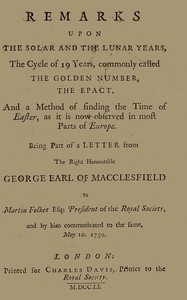Remarks upon the solar and the lunar years, the cycle of 19 years, commonly…
"Remarks upon the solar and the lunar years, the cycle of 19 years, commonly called the Golden Number, the Epact, and a Method of finding the Time of Easter, as it is now observed in most Parts of Europe" by George Earl of Macclesfield is a scientific publication written in the mid-18th century. This work discusses the complexities of the solar and lunar calendars, specifically how they relate to each other and
their implications for determining the date of Easter. It was presented in letter form to Martin Folkes, the President of the Royal Society, highlighting significant calendrical calculations and reforms for accurate timekeeping. The book elaborates on the mathematical relationships between the solar year, lunar year, and the cycle of 19 years that governs the timing of new moons and the celebration of Easter. It explains the discrepancies in the Julian and Gregorian calendars and how these affect the calculation of Easter's date. It also presents a method for adjusting the Golden Numbers used in calendars to account for these discrepancies, ensuring that the dates of the Paschal Full Moons align more closely with actual lunar events. The author demonstrates the necessity of periodic adjustments to maintain the calendar's alignment with astronomical phenomena, providing an analytical approach to timekeeping that would have implications for both scientific study and religious practice in Europe. (This is an automatically generated summary.)
Read or download for free
| How to read | Url | Size | |||
|---|---|---|---|---|---|
| Read now! | https://www.gutenberg.org/ebooks/62764.html.images | 77 kB | |||
| EPUB3 (E-readers incl. Send-to-Kindle) | https://www.gutenberg.org/ebooks/62764.epub3.images | 245 kB | |||
| EPUB (older E-readers) | https://www.gutenberg.org/ebooks/62764.epub.images | 244 kB | |||
| EPUB (no images, older E-readers) | https://www.gutenberg.org/ebooks/62764.epub.noimages | 88 kB | |||
| Kindle | https://www.gutenberg.org/ebooks/62764.kf8.images | 285 kB | |||
| older Kindles | https://www.gutenberg.org/ebooks/62764.kindle.images | 271 kB | |||
| Plain Text UTF-8 | https://www.gutenberg.org/ebooks/62764.txt.utf-8 | 55 kB | |||
| Download HTML (zip) | https://www.gutenberg.org/cache/epub/62764/pg62764-h.zip | 215 kB | |||
| There may be more files related to this item. | |||||
Similar Books
About this eBook
| Author | Macclesfield, George Parker, Earl of, 1697?-1764 |
|---|---|
| Title | Remarks upon the solar and the lunar years, the cycle of 19 years, commonly called the golden number, the epact, and a method of finding the time of Easter, as it is now observed in most parts of Europe |
| Credits |
Produced by MWS, Eleni Christofaki and the Online Distributed Proofreading Team at https://www.pgdp.net (This file was produced from images generously made available by The Internet Archive) |
| Reading Level | Reading ease score: 54.3 (10th to 12th grade). Somewhat difficult to read. |
| Language | English |
| LoC Class | CE: History: Technical Chronology, Calendar |
| Subject | Easter -- Early works to 1800 |
| Subject | Calendar -- Early works to 1800 |
| Subject | Calendar reform -- Early works to 1800 |
| Category | Text |
| EBook-No. | 62764 |
| Release Date | Jul 26, 2020 |
| Copyright Status | Public domain in the USA. |
| Downloads | 184 downloads in the last 30 days. |
| Project Gutenberg eBooks are always free! | |

